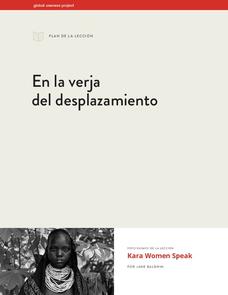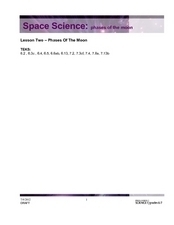Intel
Starquest
Almost every ancient culture observed the stars and saw pictures in the patterns. Studying stars allowed them to guide travelers, determine when to plant crops, when to harvest food, and the stories surrounding the images include some of...
PBS
Frankenstein: The Consequence of Creation
Famous as a horror story, as the first science fiction novel, Frankenstein is also a tale of ambition, a warning about unbridled science, and responsibility for actions. Readers consider what the tale says of the consequences of creation...
Curated OER
1st Grade Science Jeopardy
This is one of the best Jeopardy-style presentations I've seen. Young scientists play a game whose categories include, Mammals, Reptiles, Fish, Birds, and Insects. One very nice component of this PowerPoint is that there is a review...
Global Oneness Project
On the Verge of Displacement
By having scholars tackle this interdisciplinary lesson, they'll see how social studies and environmental science are related as they explore the impact that the construction of a dam will have on the population and ecosystem of the Omo...
Curated OER
Space Science: Phases of the Moon
Looking for a terrific lesson on the phases of the moon that has lots of good worksheets? With two excellent websites are embedded in the plan, the activity is sure to spark some interest in your astronomy unit. Some common...
Curated OER
Jeopardy Game - Science
Used in an upper elementary classroom, this presentation could be a center activity or a whole-group experience. This is a great way to review a variety of scientific topics. There are questions relating to the planets, rock formations,...
NOAA
Ocean Acidification
If tap water is more acidic than ocean water, why are we so concerned about ocean acidification? The third installment of a 23-part NOAA Enrichment in Marine sciences and Oceanography (NEMO) program focuses on carbon dioxide levels in...
NOAA
Plate Tectonics II
Mid-ocean ridges, rift valleys, island arcs, mountain ranges, earthquakes, volcanoes ... there are so many features associated with plate tectonics. The 14th installment of a 23-part NOAA Enrichment in Marine sciences and Oceanography...
Towson University
Mystery Tubes
How do scientists know they're right? Truth be told, they don't always know. Explore the scientific process using mystery tubes in an insightful activity. Young scientists discover how to approach and solve problems in science, how ideas...
Steve Spangler Science
Boo Bubbles Bouncing Smoke – Dry Ice Bubbles Experiment
Don't let your lesson plans go up in smoke—unless they include Boo Bubbles, of course! An engaging laboratory mixes liquid soap and dry ice to create smoky bubbles that burst on impact, making it the perfect way to celebrate Halloween in...
Teach Engineering
Fun Look at Material Science
Introduce materials science with a class demonstration. After showing a PowerPoint presentation on materials and their properties, instructors provide a ceramic tile, a Popsicle stick, a paper clip, and a plastic bag as examples of...
EngageNY
Making Inferences About Informational Text: Science Talk on How My Insect Contributes to the Rainforest Ecosystem
We need to talk. Learners participate in a science talk by discussing the idea of how insects are important to the rainforest. They record notes about their conversations as they talk. For homework, pupils add to their field journals.
EngageNY
End of Unit Assessment Part II: Science Talk
Scholars complete Part 2 of their end of unit assessment by having a science talk. Pupils pair up to answer questions about what makes a natural disaster. As one learner talks, the other records what is said. They then trade places.
Baylor College
Lungometer
Life science learners construct lung-o-meters from gallon-sized milk jugs and then measure their lung capacities. For older students, have them graph the vital lung capacities of each person in the class. Cross-curricular pieces are...
Nevada Outdoor School
Let It Snow! Let It Melt!
Winter weather offers a great opportunity to teach young scientists about the states of matter. This activity-based lesson includes a range of learning experiences, from experimenting with the rate at which ice melts to singing a song...
Baylor College
Comparing Sizes of Microorganisms
Kids compare what printed text looks like with the naked eye and under magnification. They discuss the extremely small scale that must be used to measure the size. They learn about the micrometer unit, then draw scale models of a variety...
Oregon State
World Map of Plate Boundaries
Young geologists piece together the puzzle of plate tectonics in an earth science lesson. Given a physical map of the world, they search for land formations that indicate the location of different types of plate boundaries.
Association of American Geographers
Project GeoSTART
Investigate the fascinating, yet terrifying phenomenon of hurricanes from the safety of your classroom using this earth science unit. Focusing on developing young scientists' spacial thinking skills, these lessons engage learners in...
Curated OER
Applied Science - Science and Math Lab 4B
Learners experiment with the combination of vinegar and baking soda. In this applied science lesson, future scientists compare qualitative and quantitative data collected from their exploration. Then they work together to analyze and...
Rivanna Regional Stormwater Education Partnership
Invisible Passengers
How does water pollution affect the organisms living in the water? Use three science experiments to examine how erosion and other pollutants can affect water quality. Each experiment focuses on a different aspect of pollution and...
PBS
Breaking it Down
After challenging themselves to correctly choose the form of erosion and length of time required for a given landform to develop, earth science class members model mechanical and chemical weathering with various lab demonstrations over...
Curated OER
Applied Science - Science and Math Lab
Students investigate topology. In this Applied Science lesson students explore higher, more abstract mathematics using tangles. Students make topologically related shapes.
Curated OER
Science: Let's Investigate!
This presentation on the scientific method uses simple terms for young learners. It will elicit a lot of discussion in your class as they figure out what the people in the slides are trying to discover. Very nice!
National Wildlife Federation
Massive Migrations
Turn your students into flocks of migratory birds for this fun activity on animal migration. Prior to the activity, the teacher creates four different migration routes in the classroom or any available open space, labeling nesting...
Other popular searches
- Earth Science
- Physical Science
- Life Science
- Science Project
- Science Space
- Environment Science
- History of Science
- Environmental Science
- Pe Science
- Family and Consumer Science
- Consumer Science
- Social Science

























